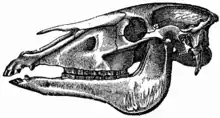Horse skulls
In Ireland, England, Wales, and the Scandinavian Peninsula, horse skulls have been found concealed in the structures of buildings, usually under the foundation or floor.[1][2][3] Horse skulls have also been found in buildings in the United States, although in far fewer numbers.[4] As part of the larger folk tradition of concealing objects in structures, horse skulls are related to concealed shoes, dried cats, and witch bottles.

Skull of a horse
There are two main theories as to the reason for depositing the horse skulls in buildings: as a method for enhancing the acoustics of a room, such as in a church or in a threshing barn; or as a method for repelling evil spirits such as witches and ghosts.[1]
See also
References
- Hoggard, Brian (2004), "The archaeology of counter-witchcraft and popular magic", in Davies, Owen; De Blécourt, William (eds.), Beyond the Witchtrials: Witchcraft and Magic in Enlightenment Europe, Manchester University Press, ISBN 978-0-7190-6660-3
- Hukantaival, Sonja, Horse Skulls and "Alder Horses": The Horse as a Depositional Sacrifice in Buildings.
- Manning, M. Chris (2012), Homemade Magic: Concealed Deposits in Architectural Contexts in the Eastern United States Master’s thesis, Anthropology Program, Ball State University, Muncie, IN.
- Merrifield, Ralph (1987), The Archaeology of Ritual and Magic, Batsford, ISBN 978-0-7134-4870-2
External links
- Horse Skulls at Bay Farm Cottage, Carnlough, Jim Mallory and Finbar McCormick.
This article is issued from Wikipedia. The text is licensed under Creative Commons - Attribution - Sharealike. Additional terms may apply for the media files.